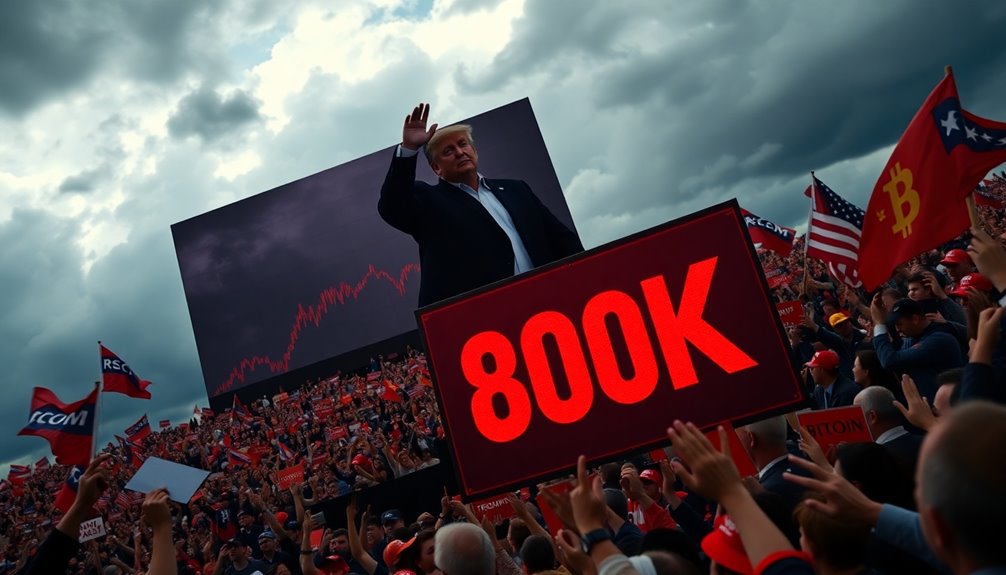Trump's crypto policies might create significant regulatory uncertainty that could lead to a Bitcoin crash at $80K. If the SEC shifts to stricter regulation, investor confidence may waver, resulting in immediate price declines. The classification of many assets as securities often causes market panic, dropping prices by over 5% swiftly. As the market reacts to these potential changes, your ability to adapt becomes crucial. The volatile environment could further sway investor sentiment, amplifying risks as liquidity erodes. Understanding these dynamics is key, and there's more to uncover about the implications of these policies.
Trump's Regulatory Impact on Crypto

As the landscape of cryptocurrency evolves, Trump's regulatory impact on the sector could bring significant changes. You might notice a shift away from the SEC's previous "regulation by enforcement" strategy under new leadership. With Paul Atkins at the helm, expect clearer guidelines for classifying digital currencies, which could reduce uncertainty for market participants. The anticipated issuance of no-action letters may grant temporary relief to DeFi platforms, easing ongoing enforcement tensions. Additionally, legislative efforts like the FIT 21 Act aim to clarify jurisdiction between the SEC and CFTC. This regulatory clarity could stabilize the market, benefiting companies previously targeted by the SEC and attracting more investment and innovation in the crypto space. Furthermore, the potential for bipartisan cooperation in shaping effective crypto policies could pave the way for a more favorable regulatory environment.
Recent SEC Enforcement Actions

While the SEC's recent enforcement actions have sent shockwaves through the cryptocurrency market, their immediate impact is clear: prices plummet and trading volumes contract.
When the SEC classifies certain crypto assets as securities, you see a rapid sell-off, often resulting in price drops of 5.2% within three days and up to 17.2% over a month.
This regulatory uncertainty creates a fragile market atmosphere, where buyers hesitate, and liquidity erodes. Enforcement-heavy strategy disrupts markets and erodes investor confidence, further complicating the outlook.
Smaller and volatile crypto assets are particularly vulnerable, facing pronounced losses as trading volumes shrink.
The ongoing Ripple lawsuit exemplifies the confusion surrounding crypto classifications, making it harder for investors to navigate.
As the landscape shifts, the SEC's actions leave many wondering about the future of their investments.
Investor Sentiment Shifts

Investor sentiment in the cryptocurrency market has shown significant shifts, particularly in response to recent events and regulatory developments.
During holiday periods, you might notice an elevated risk appetite, which boosts liquidity and market returns. However, this positive sentiment can also weaken the traditional holiday effect, as investors pivot from conventional financial avenues to cryptocurrencies. Research indicates that increased risk appetite during holidays encourages investment in higher-risk assets like cryptocurrencies.
Social media plays a crucial role; positive sentiment shared online often drives prices higher. Yet, herding behavior can influence market dynamics, especially in downturns.
After recent crashes, you may see cryptocurrency enthusiasts promoting positivity through collective efforts, like the "wagmi" movement, attempting to shift sentiment back toward optimism.
This dynamic landscape keeps you on your toes as an investor.
Corporate Blockchain Integration

Companies across various sectors are increasingly recognizing the potential of blockchain technology to enhance operational efficiency and transparency. For instance, Walmart tracks product movement from farms to stores, boosting transparency.
Nestlé uses blockchain for baby food supply chain management, empowering farmers. In logistics, Maersk improves shipment tracking, while Oracle's blockchain application provides multi-tier visibility in supply chains. Additionally, companies leveraging technology for product and service enhancement are driving innovation and efficiency.
In healthcare, Pfizer tracks pharmaceutical inventory to enhance data security, and Novo Nordisk secures patient data in clinical trials.
Financial services also benefit; JPMorgan Chase's Onyx facilitates real-time settlements, and Prudential's blockchain platform streamlines trade for SMEs.
These integrations not only improve efficiency but also set the stage for broader adoption, showcasing blockchain's transformative potential across industries.
Election Campaigns and Crypto Policies

As the political landscape evolves, the intersection of election campaigns and cryptocurrency policies is becoming increasingly significant.
The Federal Election Commission allows political committees to accept crypto donations, classifying them as "in-kind contributions." However, the market value is based on the cryptocurrency's worth on the donation day, with strict disclosure requirements. Individual federal candidates are also permitted to accept cryptocurrency donations, expanding the scope of potential contributions.
While states like Arizona and California permit these donations, others like Michigan and North Carolina impose bans due to volatility concerns.
The crypto industry's growing influence on campaign finance raises questions about election integrity and transparency.
As pro-crypto PACs gain traction, they shape policies that could impact regulations, making it crucial for you to stay informed on how these developments might affect your investments.
024 Election's Crypto Implications

The recent election has sparked significant implications for the cryptocurrency landscape, particularly with Trump's victory.
Bitcoin surged past $75,000, and altcoins like Ethereum and Dogecoin also enjoyed substantial gains. This enthusiasm led to increased market volatility, highlighting investor uncertainty. With Trump’s pro-crypto policies taking shape, many investors are optimistic about the future of digital currencies. Analysts attribute the recent price movements to a combination of macroeconomic factors and growing institutional interest in cryptocurrencies. Key discussions surrounding regulatory clarity have also bolstered confidence among investors. As the market responds to these developments, many are keenly monitoring the bitcoin price drivers this week to gauge potential trends for the near future.
With 7% to 21% of Americans owning crypto, your vote matters—73% of crypto investors say a candidate's stance on the industry influences their decisions.
Trump's administration may ease regulations, especially with the potential removal of SEC chair Gary Gensler.
However, the market remains volatile, with annualized volatility hitting 74.4%.
As you navigate these changes, consider diversifying your investments and setting predefined entry and exit points to manage risks effectively during this election season.
Frequently Asked Questions
How Does Bitcoin Mining Impact the Environment?
Bitcoin mining significantly impacts the environment through high energy consumption, generating substantial carbon emissions, and producing electronic waste.
You mightn't realize that it uses as much electricity annually as Finland, contributing to global pollution.
Additionally, the short lifespan of mining hardware leads to significant e-waste.
The mining process also requires considerable water and land, raising concerns about sustainability and the regulatory attention it attracts in various jurisdictions.
What Role Do Stablecoins Play in the Crypto Market?
Stablecoins are like the superheroes of the crypto market, saving the day from volatility chaos! They act as reliable mediums for transactions, enabling swift and cost-effective exchanges globally.
In DeFi, they're the lifeblood, providing essential liquidity for lending and trading. With trading volumes skyrocketing, stablecoins bridge the gap between traditional currencies and crypto-assets, making them indispensable in today's financial landscape.
Without them, the crypto world would be a tumultuous rollercoaster ride!
Are There Alternative Cryptocurrencies to Bitcoin Worth Investing In?
Absolutely, there are several alternative cryptocurrencies worth considering.
Bitcoin Cash (BCH) offers faster transactions, while Ripple (XRP) excels in cross-border payments.
Solana (SOL) supports decentralized apps, making it a robust option.
Cardano (ADA) is an open-source blockchain with long-term potential.
Each of these cryptocurrencies has unique features, so it's essential to research and assess which aligns best with your investment strategy and risk tolerance.
How Do Global Regulations Affect Bitcoin's Price?
Global regulations significantly impact Bitcoin's price. When governments implement or change regulations, you might see immediate price fluctuations.
For instance, bans can lead to sharp declines, while acceptance can drive prices up. Different countries have varying approaches, creating a complex landscape.
As regulations evolve, you'll need to stay informed, as they can discourage trading or encourage investment, affecting market sentiment and ultimately, Bitcoin's value in the short and long term.
What Is the Historical Performance of Bitcoin During Election Years?
During election years, Bitcoin's historical performance shows a consistent trend where its price on election day often acts as a price floor, leading to parabolic rallies.
For instance, after the 2020 election, Bitcoin surged from $13,569 to over $69,000.
Traders are currently betting on a similar outcome, expecting Bitcoin to rally after the upcoming election, influenced by market anticipation and potential economic policies regardless of the election outcome.
Conclusion
As Trump's policies unfold, you might see increased regulation, shifting investor sentiment, and corporate hesitations all affecting Bitcoin's trajectory. If the SEC ramps up enforcement and candidates embrace strict crypto stances, you could witness a significant market shake-up. With the potential for a crash at $80k looming, it's crucial to stay informed and agile. Whether you're investing, trading, or simply watching, the future of crypto under these conditions is anything but certain.









